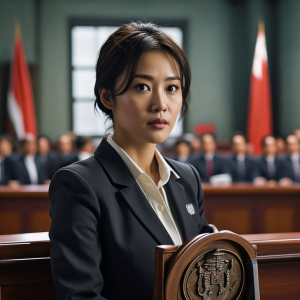
Divorce Hearings – Request for Order
The courts schedule initial hearings after the first set of divorce pleadings are filed. There may be short divorce hearings on requests for temporary reliefs that seek court-orders that grant temporary custody, visitation rights, child support, spousal support or restraint until the divorce is decided. Temporary orders are not the final decision of the court. Instead, they are intended to enable the couple and children involved in the divorce to continue living as comfortably as possible before the final judgment. Temporary orders cannot be appealed, they can only be reviewed during the next family court hearing.
In all the divorce hearings, lawyers do most of the talking, but if one of the couple being divorced is asked to testify, then they must swear to tell the truth. The lawyer argues the case, but in the absence of a lawyer, spouses can argue the case for themselves.
A divorce case can be over only after the initial hearing when the spouses agree to settle the matter, and the judge believes the agreement is fair and reasonable to the parties involved. However, if the spouses do not agree on issues, then another court hearing is scheduled. The case may last for months or even years. In all hearings that come after the first hearing, the judge often considers testimonies and evidence regarding the disputed issues. During these hearings, one may be able to present witnesses and any other evidence available to allow the judge to decide on the matter.

Case settlement conference
Before going to trial, the parties may have a settlement conference with the judge. Generally, the parties (each of the couple) submit proposed resolutions for the case where they then meet with a judge (not the trial judge) to negotiate resolutions. Unlike divorce hearings or trial, the settlement conference is often private, and the parties get to have more opportunity to speak for themselves. If parties agree in the settlement conference, the final papers are presented to the court for approval and signing.
Mandatory settlement conferences require the presence of both parties and the lawyers who will try the case, unless excused by the court for good cause. Cal Rules of Ct 3.1380 (b)
Although the parties and attorneys often come to settlement conferences having already attempted but failed to settle the case, most cases do settle as a result of the conference. There are probably two primary reasons for this. One is that the approaching trial date is a powerful inducement to settle, and the other is the presence of the settlement conference judge. The judge may indicate what results are likely if the case goes to trial. Particularly in counties in which the settlement conference judge will also be the trial judge, the judge’s indication of the likely outcome at trial provides a significant impetus toward settlement.
The attorney should prepare the client for the settlement conference. The procedure used by the particular settlement conference judge (e.g., meetings with attorneys outside of clients’ presence) should be explained so that the client will not be surprised or unduly disturbed by it. The settlement posture of the case should be discussed with the client to prepare him or her for settlement decisions that are reasonably likely to arise.
At the settlement conference, the attorney should bring a document that will be used to check-off the issues covered by any settlement that is reached, to ensure that no issue is missed on which an order is desired. Ideally, the document should be a list specifically prepared for this purpose, but the settlement conference statement might suffice.
Most divorces do not go to trial. However, if a case does go to trial, the divorce hearings becomes more involved, in this case presence and representation by an experienced divorce attorney is strongly advised. In a trial, there is no jury and the judge is the decision-maker. Witnesses and evidence may be called. A trial could last for a day to a few weeks depending on the issues. At the end of the trial, the judge makes a ruling.
It is important to note that uncontested divorce (unlike contested) does not require any divorce court hearings.
call 714-390-3766

